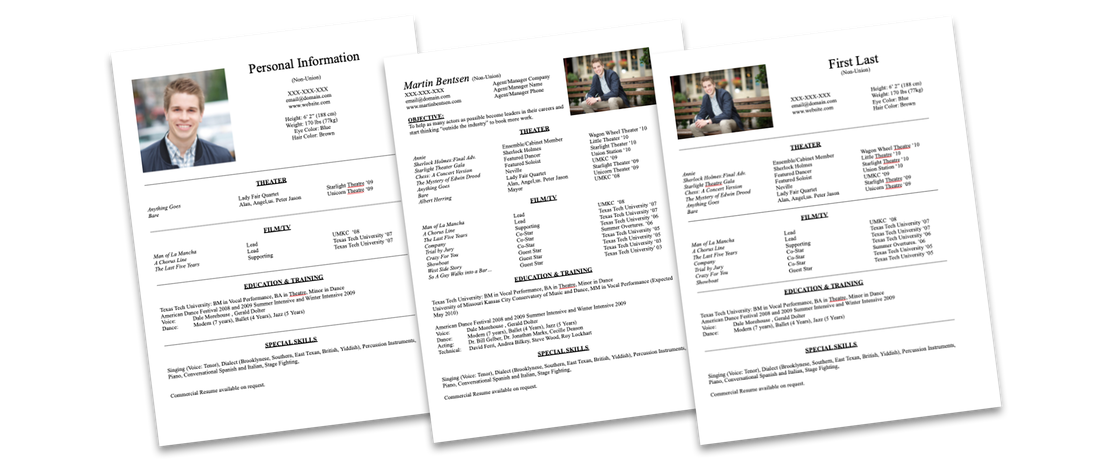The Actor's Toolkit
My Three Favorite Tools to Grow Your Career
Tool #1: Pro Actor Resume Templates
|
Actor Resume Checklist
|
Now if you want to better understand and implement each of the above into your resume, I highly recommend reading my Ultimate Guide to Actor Resumes.
Tool #2: Agency Cover Letter Template
Reach Out to Agents Effectively
The first impression you make when contacting an agent is critical because it tells an agent how likely you are to be a great client... or a problematic one.
This cover letter template has seen response rates as high as 28% for some actors (of course depending on their level of experience and number of credits). Learn how to showcase your strengths, achievements, and the amazing value you bring to the table – all in one simple, short cover letter.
Let's dive right in:
This cover letter template has seen response rates as high as 28% for some actors (of course depending on their level of experience and number of credits). Learn how to showcase your strengths, achievements, and the amazing value you bring to the table – all in one simple, short cover letter.
Let's dive right in:
Agency Cover Letter TemplateSubject Line: Actor Seeking Representation Body Text: Hi Joe Divola, Elaine Benes suggested I reach out to you. My name is Art Vandelay and I'm an actor and dancer currently looking for representation in the New York City area. I was previously represented by Newman Artists' Agency in LA and am now based in NYC. This summer I studied at The Stella Adler Studio of Acting in NYC and I completed a screen-acting intensive at The American Academy of Dramatic Arts. I also performed in an industry showcase titled Bound for Broadway. I understand you’re probably extremely busy and I don’t want to take up any more of your time. I’ve attached my headshot and resume, and if you’d like you can view clips of me performing at www.jerry.com. I’d love to have the opportunity to interview with you if you’re currently looking for actors to represent. Thanks so much for your time, Art |
In order to increase your chances of being invited to a meeting with an agent, keep the following in mind when drafting your cover letter:
- Don't include things that will get your submission sent to the spam folder. Avoid more than two attachments and more than two links. The more attachments and links you include, the more likely your email will never get seen.
- Don't forget to follow up. I recommend using a free tool like Follow Up Then – you can BCC [email protected] and you'll get a reminder to follow up if you haven't heard back and were expecting to. Alternatively, you can use Gmail Read Receipts – these tell you if your email has been opened or not (but take note: Gmail Read Receipts can sometimes cause your email to go to spam, so if you don't see it was opened at all, you can try sending another copy of your email with the Read Receipts setting turned OFF.
- Never lie. When agents begin considering you seriously for representation, they'll double and triple check all the productions you mention on your resume and any experience you mention in your cover letter. Because it can be hard to narrow down great actors, one way agents make their jobs easier is simply by looking for things you did wrong – such as lying on your cover letter – to help them weed you out.
- Don't focus too much on yourself. It's best to talk about why you're so interested in working with that specific agent and what you can do to help them out – rather than focusing on your experience and why you're better than other actors. The more you focus on them, the more likely they'll read through your entire cover letter.
- Example focused on you: "I would love the opportunity to be represented by you because I've been in numerous productions, including NAME, NAME, and NAME."
- Example focused on them: "I would love the opportunity to take my experience playing cop and detective roles (such as those I played in NAME, NAME, and NAME) and use it to bring a brand new Type to your roster (I noticed you don't represent many "detective" Types currently)."
- Don't be fake. Fake enthusiasm can come across as dishonest and make them question whether you'll be easy to work with on set. You should truly ask yourself why this agent would be so great for you and not simply make up a generic answer. The more specific you are, the better.
- Don't mention unrelated and irrelevant skills that any serious actor should have. Examples include interpersonal skills, confidence, problem-solving skills, positive attitude, time management, memorization, or training in performance arts. You can mention these skills on your resume if they are critical, but they should absolutely not be discussed in a cover letter. They're so generic that they can come across as meaningless.
Tool #3: Agency Contact Info
Connect With 140 Agencies Across the Globe
This resource includes the website, submissions instructions, phone number, and email address of over 140 legitimate agencies around the world.
BUT BE CAREFUL WITH IT.
Before mass-mailing out your contact info, I strongly encourage you to read this in-depth guide I've created called How to Get a Talent Agent: The Ultimate Guide.
I outline the best strategy to follow to maximize your chances of being called in, while minimizing your chances of getting your photo plastered on their "wall of shame" (yes, that's a real thing).
It's difficult as a brand new actor to get signed immediately. For that reason, I recommend trying to get at least 2-3 credits in smaller, indie or student films first. Once you have those credits, it will be significantly easier to get an agent interested in meeting you.
If you want to learn how to get your first 2-3 acting credits FAST, I highly recommend checking out my mini course called Kickstart Your Acting Career.
BUT BE CAREFUL WITH IT.
Before mass-mailing out your contact info, I strongly encourage you to read this in-depth guide I've created called How to Get a Talent Agent: The Ultimate Guide.
I outline the best strategy to follow to maximize your chances of being called in, while minimizing your chances of getting your photo plastered on their "wall of shame" (yes, that's a real thing).
It's difficult as a brand new actor to get signed immediately. For that reason, I recommend trying to get at least 2-3 credits in smaller, indie or student films first. Once you have those credits, it will be significantly easier to get an agent interested in meeting you.
If you want to learn how to get your first 2-3 acting credits FAST, I highly recommend checking out my mini course called Kickstart Your Acting Career.
|
I hope you enjoyed The Actor's Toolkit! I've helped over 15,000 actors move their careers forward, and I hope that one day we can all end the cliche of "the starving artist" together. If you enjoyed this resource, be on the lookout for the emails I send each week with strategies and hacks to move your career forward. I hope to hear of your future success! - Martin Bentsen Actor Marketing Coach |




